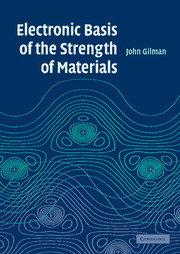Book contents
- Frontmatter
- Contents
- Preface
- Section I Introduction
- Section II Elements of solid mechanics
- Section III Elements of electron mechanics
- Section IV Elastic stiffness
- Section V Plastic strength
- Section VI Fracture resistance
- 19 Mechanics of cracks
- 20 Surface and interfacial energies
- 21 Fracturing rates
- Index
- References
19 - Mechanics of cracks
Published online by Cambridge University Press: 14 August 2009
- Frontmatter
- Contents
- Preface
- Section I Introduction
- Section II Elements of solid mechanics
- Section III Elements of electron mechanics
- Section IV Elastic stiffness
- Section V Plastic strength
- Section VI Fracture resistance
- 19 Mechanics of cracks
- 20 Surface and interfacial energies
- 21 Fracturing rates
- Index
- References
Summary
The ultimate determinant of strength is fracture. Its upper limit is the cohesive strength of a material, but it is rare that the cohesive strength can fully manifest itself. Almost always, mechanisms intervene that concentrate the macroscopic stress into small regions where the local stress may be 10 000 times, or more, larger than the nominal applied stress. The most effective stress concentrators are cracks. Like levers, they concentrate the work that is done by macroscopic applied forces into small microscopic volumes.
Elements of cracking
Two centuries ago young men could make a living by splitting trees lengthwise into “rails” to be used for fence construction. Cracking could also be used to split large rocks in quarries. Figure 19.1 illustrates a splitting crack. Here a crack has traversed about half the length of a rod of material (perhaps a wooden log). The crack bisects the thickness, 2t, of the rod (whose width is w). The length of the crack is L, and it forms two cantilever beams each of thickness t and width w. Suppose that a wedge applies forces, F, pushing the ends of the cantilevers apart, thereby displacing each of them a distance, h, from the center-line of the rod. These displacements increase by small amounts, dh, if the tip of the crack advances incrementally by an amount dL.
Information
- Type
- Chapter
- Information
- Electronic Basis of the Strength of Materials , pp. 247 - 253Publisher: Cambridge University PressPrint publication year: 2003
